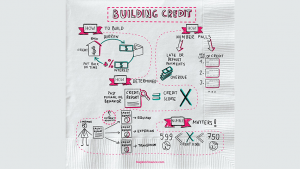
Recent news about dramatic declines in the Dow Jones have been front and center lately. While the “Dow” is often first quoted on the news, it is not a particularly good representation of the U.S. stock market. It is just an index of 30 companies. Also, it is price-weighted, which means the companies with the highest stock price carry the most weight. The five companies that currently carry the greatest weight in the Dow are Boeing, Goldman Sachs, 3M, United Health Group, and Home Depot. However, none of these companies crack the top ten when looking at the largest companies in the U.S. by market capitalization.
Alternatively, the S&P 500 is an index of about 500 companies, making it a much broader barometer of the U.S. stock market. Moreover, it is market-weighted, so the largest companies by market capitalization carry the greatest weight.
Headline vs. Reality
Headline: On February 5, 2018, the Dow experienced the largest point drop in history.
Reality: On February 5, 2018, the S&P 500 declined 4.10 percent, which ranks as only the 39th worst in the last 40 years.
Why has the stock market declined?
Believe it or not, the recent declines were prompted by good news.
January payroll reports show 200,000 workers were added to U.S. payrolls and, more importantly, average hourly wages increased 2.9 percent from January 2017. This was the highest level of year-over-year wage growth since June 2009. In anticipation of a strong jobs report and a pick-up in wage inflation, bond markets drove yields on the benchmark 10-Year U.S. Treasury bond sharply higher from a closing level of 2.63 percent on Thursday, January 25 to an intraday high of 2.88 percent on Monday, February 6. This sudden rise in market interest rates spooked equity investors in several ways. It could indicate both a faster pace of Fed rate hikes to keep up with inflation and an increase in borrowing costs for U.S. corporations.
What should I do about it?
I don’t get emotional about stock market swings. Stock market swings are sometimes irrational. Look to the fundamentals instead. In my view, nothing has really changed in the last week from a fundamental or economic perspective. We believe the cyclical backdrop for stocks remains positive given synchronized global growth, rising corporate profits and relatively easy monetary conditions compared to history in the U.S. and abroad.
At RCB Bank Trust, we are conservative, long-term investors.
We don’t try to time the market and we don’t overreact to headlines and short-term volatility. That being said, this is a great time to gut-check your risk tolerance and make sure your asset allocation is right.
We offer free portfolio reviews at no cost, no obligation. We’d be happy to take a look at your current portfolio and offer a second opinion to ensure you’re getting the most out of your investments. Connect with a wealth advisor in your area.




